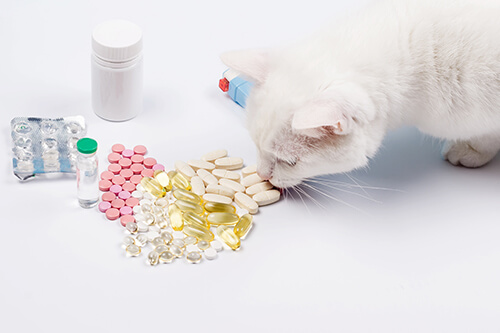Antifreeze, insecticides, chocolate, certain indoor plant species – most pet owners are familiar with these common toxic substances for pets. But it may surprise you to learn that according to the American Veterinary Medical Association, poisoning by human drugs is the most common type of poison exposure for pets.
This category of toxins includes both over-the-counter medications as well as prescription drugs. In some cases, curious cats and dogs get into pill bottles or packages that have been left within reach. In other instances, well-intentioned pet owners give their pets human medications in an attempt to treat upset stomachs or pain.
While there are a small number of human medications that can be safely consumed by pets, many others are toxic and the dose is critical. Before giving any human medications to your pet, be sure to consult with a veterinarian. Below is a list of common human medications that are toxic for pets, and tips for keeping your pets safe.

1. NSAIDS (Nonsteroidal Anti-inflammatory Drug) & Pain Medications.
NSAIDS are readily available over-the-counter medications that are used by humans to treat pain. This category of drugs includes Ibuprofen (Advil, Motrin) and Naproxen (Aleve, Naprosyn).
When consumed by cats and dogs, NSAIDS can cause vomiting, diarrhea, stomach and intestinal ulcers and perforations, kidney and liver failure, and even death. Another common pain medication, Acetaminophen (Tylenol), can also cause liver failure and red blood cell damage, especially to cats.
If your pet is experiencing pain, ask your vet about dog and cat friendly NSAIDS, and neve give them something from your own medicine cabinet.
2. Antidepressants, Anti-anxiety, & Sleep Aid Medications
Antidepressants such as Duloxetine (Cymbalta) and Venlafaxine (Effexor); antianxiety medications such as Alprazolam (Xanax) and Clonazapem (Klonopin); and sleep aids such as Zolpidem (Ambien) can cause pets to become severely sedated.
Pets who consume these drugs may also develop neurologic problems such as tremors or seizures, or become very agitated with severely elevated heart rates. One pill is often enough to cause severe problems and even death.
Though veterinarians may occasionally prescribe a select few medications of this nature to pets, the majority of these medications are dangerous. Because of their prevalence, accidental ingestion is common.
3. ADD & ADHD medications.
Medications used to manage ADD & ADHD (such as Concerta, Adderall, and Ritalin) are stimulants, and contain amphetamine. Just a small amount of this medication can lead to life-threatening tremors, seizures, elevated body temperatures, cardiac arrest and respiratory failure in pets.
Symptoms may not begin immediately, and can worsen over time once they do begin.
4. Heart/Blood pressure medications.
When consumed by pets, beta-blockers like Atenolol (Tenormin), Metoprolol succinate (Toprol), and Carvedilol (Coreg) can cause life-threatening decreases in blood pressure and a very slow heart rate.
Less severe problems can also occur from pets ingesting ACE Inhibitors such as Lisinopril (Zestril) and Ramipril (Altace).
How to keep your pets safe from toxic medications
Accidental ingestion of medications is common, since our pets are curious and medications can look very similar to food and treats. It’s important to ensure medications are kept out of reach of pets to avoid accidental ingestion. Here are a few tips to keep your pet safe:
In the event that your pet ingests a medication meant for human consumption, call your veterinarian immediately or call the ASPCA Poison Control Hotline at 888-426-4435.